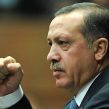
Kurdish Debate Dominates Turkish Politics
Publication: Eurasia Daily Monitor Volume: 6 Issue: 162
By:

Since Prime Minister Recep Tayyip Erdogan revealed that his government is working on a plan to address the Kurdish question, the debate has dominated Turkish politics. It is uncommon for Turkish politics to be dominated by a single issue over a long period, however, the country as a whole has debated little else over the past three weeks.
As the coordinator of the peace initiative, the Interior Minister Besir Atalay met with various political parties and NGO’s to seek their support. More recently, Atalay shared his views with members of the National Security Council (MGK), including the Chief of the General Staff General Ilker Basbug, and other force commanders, during meetings with various segments of society and political actors (Today’s Zaman, August 21).
During the meeting, the military members of the MGK expressed their concern about the unitary nature of the country, and stressed the view that the Kurdish initiative should not harm the unity of the country. Nevertheless, they supported the idea of granting more individual and cultural rights to the Kurdish people (Milliyet, August 21). After the MGK meeting, a press statement outlined the steps that were taken to date; which were initially decided in earlier meetings of the MGK (Sabah, August 21).
The Turkish press has emphasized that the press statement from the MGK reflects two important points. First, for a long time it was almost a cliché for every MGK statement to insert a sentence saying that it is "determined to continue to fight against terrorism." This time, however, there was no statement on continuing to combat terrorism (Hurriyet, August 21). This is important since one of the results of the meetings Atalay conducted was in response to the public demand to stop the clashes between the Kurdistan Workers’ Party (PKK) and the military. In fact, the PKK and its political wing, the Democratic Society Party, share a similar view: arguing that "the PKK declared a unilateral ceasefire, and the Turkish armed forces should also stop its operations against the PKK units inside Turkey" (www.gundem-online.com, August 13).
According to the Turkish press, the second important point in the MGK statement was that it emphasizes the importance of the trilateral mechanism between Turkey-Iraq and the United Sates and Turkey’s contacts with Iraqi groups [including the Kurdish Regional Government] (Milliyet, August 21).
In addition to the MGK’s support for the initiative, other public figures have also declared their support. One well known Turkish intellectual, Yasar Kemal, publicly backed the initiative (Radikal, August 21). In addition, the singer Sezen Aksu made a telephone call to Prime Minister Erdogan in order to extend her support (Sabah, August 20).
Foreign diplomats in Ankara also noted these internal debates and welcomed its progress towards democracy, due to the country’s increasing role on the global stage. Diplomatic sources stress that a permanent solution to the Kurdish issue would improve Turkey-E.U. relations. In addition, foreign diplomats in Ankara are concerned about the tension between the opposition parties and the government and suggest that a national consensus is imperative for a successful outcome in this process (Hurriyet Daily News, August 20).
Despite securing widespread support, the opposition parties continue to harshly criticize the government’s plans. The Chairman of the Nationalist Movement Party (MHP), Devlet Bahceli stated that "the government is trying to place martyrs and butchers, our soldiers and murderers, security forces and terrorists into the same frame. It must be well known that the nationalist movement will never be a part of this game." Bahceli further argued that Erdogan and the imprisoned leader of the outlawed PKK, Abdullah Ocalan have now agreed on the same point, though he warned Erdogan that "he was leading a treasonous project aimed at dividing Turkey" (Hurriyet Daily News, August 20). The Chairman of the Republican Peoples Party (CHP), Deniz Baykal also believes that the plan proposed by the government mirrors the plan of Abdullah Ocalan (ANKA, August 4).
Perhaps, knowing that the Kurdish initiative might hurt the feelings of families who lost their loved ones during the lengthy fight against the PKK, President Abdullah Gul has invited some of them to the first Ramadan dinner (www.cnnturk.com, August 20). Whether it will produce tangible results, it appears that the government is determined to address the Kurdish question. The two critical tests for the government’s Kurdish initiatives are to ensure the MGK’s support, and convince the families of the soldiers who lost their lives during the fight against the PKK. After the latest meeting, the government has ensured the MGK’s support. However, it remains to be seen whether it will succeed in convincing the families who lost their sons in the last 25 years of the conflict.




